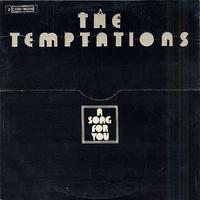
A Song for You is a 1975 album by the Temptations. It features two R&B #1 hits: "Happy People", and "Shakey Ground", one of the group's final R&B #1 songs.
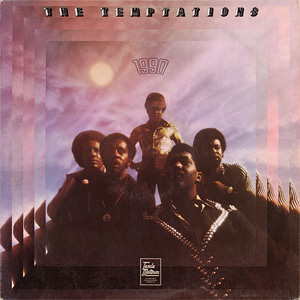
1990 is a 1973 album by The Temptations for the Gordy (Motown) label, their final LP written and produced by Norman Whitfield.

Greatest Hits is a 1966 greatest hits album for The Temptations, released by the Gordy (Motown) label. It peaked at #5 on the Billboard 200 album chart and remained on the chart for 120 weeks. Included are popular Temptations hits such as "The Way You Do the Things You Do", "Get Ready", "Since I Lost My Baby", "My Baby", "Don't Look Back", and their signature #1 hit, "My Girl". One non-album single, "Beauty Is Only Skin Deep", is also included; it was a #3 hit in the summer and fall of 1966.

Emperors of Soul is a 1994 box set compilation for The Temptations, released by Motown Records. The five-disc collection covers the Temptations' entire four-decade history, from the first recording of The Distants in 1959 to four new recordings by the then-current Temptations lineup of Ali-Ollie Woodson, Theo Peoples, Ron Tyson, and stalwart members Otis Williams and Melvin Franklin.

A Quiet Storm is the 1975 third solo album by American soul singer, songwriter, and producer Smokey Robinson. The album received generally positive reviews, and spawned the hit single "Baby That's Backatcha", which spent one week at the top of the Billboard Hot Soul Singles chart.

Patricia Eva "Bonnie" Pointer was an American singer, best known for having been a member of the vocal group, the Pointer Sisters. Pointer scored several moderate solo hits after leaving the Pointer Sisters in 1977, including a disco cover of the Elgins' "Heaven Must Have Sent You" which became a U.S. top 20 pop hit on September 1, 1979.
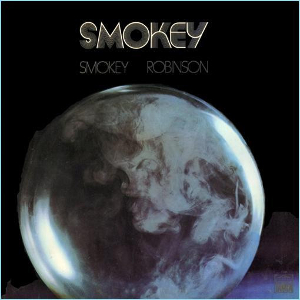
Smokey is the debut studio album by American soul singer, songwriter, and producer Smokey Robinson. It was released on June 19, 1973, by Tamla Records and was Robinson's first solo record after his departure from The Miracles. The album featured the single "Sweet Harmony", which was his tribute to his former singing partners in the Miracles: Bobby Rogers, Pete Moore and Ronnie White. Smokey was arranged by Dave Blumberg, Gene Page and Willie Hutch. It also featured the song "Baby Come Close", his first solo hit single, and the single "Just My Soul Responding", a protest song dealing with ghetto life in America, and the plight of the American Indian. Smokey peaked at number 70 on the Billboard albums chart, on which it spent 19 weeks.

Pure Smokey is Smokey Robinson's second post-Miracles album, released in 1974. It features the single "Virgin Man." Several songs were written by Robinson with fellow Miracle Marv Tarplin, who left the group a year after Robinson's departure to join him in California and assist him in his solo projects.

Love Breeze is an album by the American musician Smokey Robinson, released in 1978. It was arranged by Sonny Burke. It peaked at No. 75 on the Billboard 200.

Where There's Smoke... is a 1979 album by Smokey Robinson, released on Motown Records' Tamla label. It contains his Billboard Top ten pop hit single "Cruisin'".
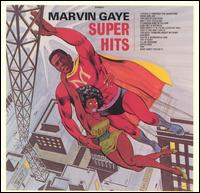
Super Hits is a compilation album by American soul singer, songwriter, and producer Marvin Gaye. It was released in 1970 by Motown's subsidiary Tamla Records and compiles Gaye's pop-R&B singles recorded from 1962 to 1969.

Greatest Hits, Vol. 2 is the second greatest hits album for The Miracles, released in 1968 on Motown Records' Tamla label. It contained the most popular singles from the successful Going to a Go-Go, Away We A Go-Go and Make It Happen albums of the 1965–1967 period. It also featured the 1964 non-album single "Come On Do The Jerk", and two B-sides, "Choosey Beggar" and "Save Me". The hit single "I Second That Emotion" was new to album. This album reached the Top 10 on the Billboard 200 albums chart, peaking at #7, and peaked at #2 on Billboard's R&B album chart. Ten of the albums' 12 songs were written by Miracles members Smokey Robinson, Pete Moore, Marv Tarplin, Bobby Rogers, and Ronnie White.
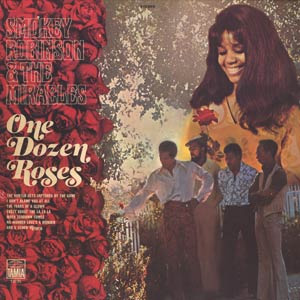
One Dozen Roses is a 1971 album by Smokey Robinson & The Miracles, issued on Motown Records' Tamla label. The penultimate album before lead singer Smokey Robinson departed the group for a solo career, One Dozen Roses features the Top 20 Billboard Hot 100 hit single "I Don't Blame You at All". Also included is the group's number-one smash hit "The Tears of a Clown", which was also made available through the reissue of the 1967 Miracles LP Make It Happen as The Tears of a Clown. Both of these songs were also huge hits in the UK, reaching #11 and #1 respectively.
100 Proof (Aged in Soul) was an American funk/soul group, who formed in Detroit, Michigan, in 1969. They were put together by former Motown songwriting team Holland-Dozier-Holland, signing the group to their new Hot Wax Records label. The group went on to release several hit singles between 1969 and 1972. The biggest of these was "Somebody's Been Sleeping", which reached #8 on the Billboard Hot 100, sold more than one million copies, and was certified gold by the Recording Industry Association of America.

1957–1972 is a 1972 double album by The Miracles on Motown Records' Tamla label. This two-record set is noted as the group's final series of live concerts with original lead singer Smokey Robinson, recorded over a period of three days, July 14–16, during the 1972 National Parks Centennial, at the Carter Barron Amphitheater in Washington, D.C., and charted at No. 75 on the Billboard Top 200 Album chart, and at No. 14 on its R&B Album chart. During the show, Smokey's wife, original Miracles member Claudette Rogers Robinson, who stopped touring with the group in 1964, reunited with the Miracles on stage for the first time in eight years. As a celebration of the group's fifteen years together, The Miracles made this an "all request" show, where audience members could choose which of the group's long string of hits they wanted performed. Also, at the end of the concert, Miracles fans were introduced to the group's new lead singer, Billy Griffin. According to Smokey's autobiography, Smokey: Inside My Life, The Miracles' final concert was videotaped in movie form, but was never publicly released. However, 1957–1972 was released on CD originally in 1990, and re-released again in 2004 along with The Miracles' 1969 "Live" album in the 2004 Motown/Hip-O Select release Smokey Robinson and The Miracles: The Live Collection.

Flying High Together is an album by Smokey Robinson and the Miracles on Motown Records' Tamla label, released in 1972. It is noted as The Miracles' last studio album with original lead singer Smokey Robinson, who retired from the act to concentrate on his duties as vice president of Motown. The album charted at #46 on the Billboard Pop Album chart, and featured two singles: the appropriately named "We've Come Too Far to End It Now", which matched the parent album's chart position on the Billboard singles chart, charting at #46, and reached the Top 10 of the Billboard R&B singles chart, charting at #9, and "I Can't Stand to See You Cry", which charted at #45 Pop, and #21 R&B.
Donald Charles Baldwin is an American musician, arranger, and composer. He achieved significant commercial success with recordings he wrote, arranged, and performed for Motown Records and Invictus/Hot Wax Records from 1970 to 1980. His Notable works include his recordings with many widely known musical acts including: Temptations, Commodores, and Bonnie Pointer, as well as record producers Holland-Dozier-Holland and Jeffrey Bowen.

The Island of Real is the ninth and final studio album by rock band The Rascals, released in 1972. It peaked at number 180 on the Billboard 200 chart. The group's final four singles — “Lucky Day,” “Brother Tree,” “Hummin’ Song” and “Jungle Walk” — failed to make the Top 100 and the Rascals disbanded.
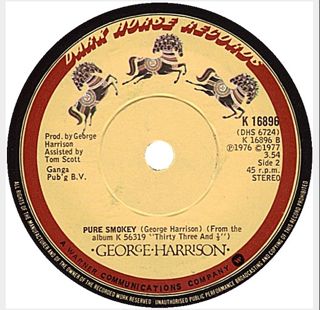
"Pure Smokey" is a song by English musician George Harrison, released in 1976 on his debut album for Dark Horse Records, Thirty Three & 1/3. The song was the second of Harrison's musical tributes to American soul singer Smokey Robinson, following "Ooh Baby " in 1975. Harrison frequently cited Robinson as one of his favourite vocalists and songwriters, and Robinson's group the Miracles had similarly influenced the Beatles during the 1960s. In the lyrics to "Pure Smokey", Harrison gives thanks for the gift of Robinson's music, while making a statement regarding the importance of expressing appreciation and gratitude, rather than forgetting to do so and later regretting it. The song title came from the name of Robinson's 1974 album Pure Smokey.

Martha Reeves is the debut album by singer Martha Reeves, released in 1974 on the MCA label. It is her first album after her position as lead singer in Martha and the Vandellas, who disbanded two years before the album's release. The album peaked at No. 94 in Australia.


















